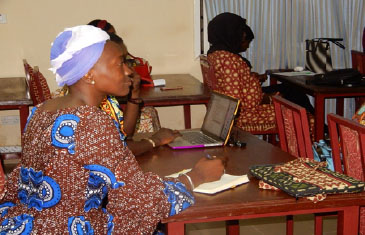
The International trade Centre (ITC) and the UN Capital Development Fund (UNCDF) are jointly implementing the project “Jobs, Skills and Finance (JSF) for Women and Youth in The Gambia Programme” under the tutelage of the Ministry of Finance and Economic Affairs of The Gambia.
The JSF Programme is funded by the European Union (EU) and aims to contribute in stabilizing the economic, social and security situation of the country during the democratic transition by facilitating social inclusion and employment of the youth and women, with a specific emphasis on promoting gender equality and addressing climate change.
With a budget of 16,000,000 EUR, the programme aims to create 3,000 direct jobs for youth and women.
Through a combination of grants, technical assistance and convening power, the programme will aim to increase employment of women and youth through green and resilient economies–by supporting local authorities and communities to develop climate resilient investments that in turn can create job opportunities for vulnerable groups through “cash for work” (C4W) and procurement to local micro, small and medium enterprises (MSMEs).
Improve opportunities in education and skills development for women, youth and MSMEs – by providing support to TVETs and other local training providers to improve the quality, and accessibility of vocational training schemes offered to youth and women which will be linked to the C4W opportunities and key sectors of economic opportunities at the local level.
Increase access to inclusive finance – by using a market systems approach to support the development and scale up of targeted financial services and products, particularly for women and youth, and the development of financial inclusive markets.
ITC is implementing the following three outputs focusing on non-financial technical assistance under the project: National TVET roadmap and skill gap assessment for priority sectors; increase value proposition (quality, affordability and accessibility) of TVET training to youths and women in provinces and Improve quality of informal skills training and apprenticeship programmes.
UNCDF and ITC will create synergies and complementarities as UNCDF provides capital/ access to finance solutions that will create skills demand through decentralized budgetary support to local government, while the ITC component contributes to this skills development.
Business and entrepreneurs whose skills have been developed will also have access to capital/ finance through the UNCDF project activities.
UNCDF and ITC will create synergies and complementarities as UNCDF provides capital/ access to finance solutions that will create skills demand through decentralized budgetary support to local government.
he UN Capital Development Fund makes public and private finance work for the poor in the world’s 47 least developed countries (LDCs).
With its capital mandate and instruments, UNCDF offers “last mile” finance models that unlock public and private resources, especially at the domestic level, to reduce poverty and support local economic development.
Source-National Youth News





